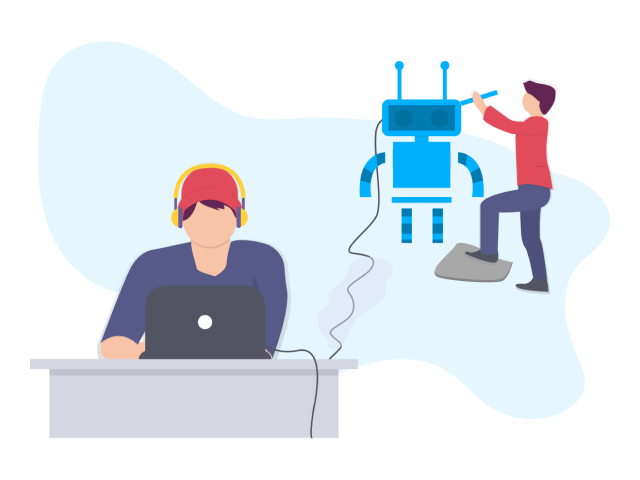In today’s digital world, with more companies relying on e-commerce to reach large international audiences, the logistics industry is now more important than ever to the business landscape. However, with the increasing complexity of global logistics requirements and the increase in data, the logistics industry is also facing greater challenges than ever before.
The logistics industry relies on many processes to facilitate the proper distribution of materials, products and services from businesses to customers or from businesses to other businesses. Thus, with the rapid development of our world and the growing need for logistics services, the industry is looking to the future of digitally optimized processes.
Here’s how AI and automation are revolutionizing the logistics industry and making it better:
Better data management and customer service
Customer service in the logistics industry is an important part of a company’s success. With the rise of e-commerce businesses, consumers are relying on online ordering more than ever. However, due to many mistakes and negative experiences with logistics companies, they are less and less trusting to shop online. One of the main benefits of implementing AI in the logistics industry is the ability to deliver a better customer experience. If you have ever ordered something online in the past, you probably know how difficult it was to contact the supplier and get information about your order.
Nowadays, all logistics companies have cloud databases that allow them to access customer and order data within seconds. Logistics companies can now more effectively manage day-to-day activities including availability, costs, flow and resource monitoring, transportation, staffing and vendors to ensure flawless processes and better customer service.
Increasing labor safety for employees
Occupational safety is paramount for any business, regardless of size or industry. Providing a healthy and safe work environment for employees is vital to avoiding injury compensation and getting a bad reputation. In addition, in addition to the legal and moral obligation of any employer to provide their employees with a safe workspace, there are also many benefits, including increased productivity, increased employee satisfaction and loyalty, and increased efficiency.
The logistics industry comes with security threats that can put logistics company employees at risk. From performing monotonous and repetitive tasks to lifting heavy objects or handling hazardous materials, the health and well-being of logistics industry workers can be affected.
However, the introduction of AI and automation can have a significant impact on improving worker safety in the logistics industry. AI and automation can reduce the risk of injury at the operational level in a supply chain warehouse by relieving workers of hazardous work procedures. For example, a packaging and palletizing robot can eliminate the risk of injury in industrial palletizing tasks such as heavy crates.
What’s more, industrial robots can take care of repetitive tasks, saving employees time and relieving them of the burden of repetition. In addition, it allows them to focus more on important tasks that can play a huge role in improving the productivity and efficiency of the entire business.
Improved accuracy and efficiency
Another major benefit of implementing AI and automation in the logistics industry is the fact that these technologies can play a huge role in improving the accuracy and efficiency of supply chain processing.
With the help of artificial intelligence, logistics companies can manage all supply chain processes more efficiently with a proactive logistics system. The main expectation of clients of logistics companies is the delivery of orders as quickly as possible. As a result, companies use a predictive logistics system to determine if there is an increase or decrease in demand from their customers and adjust production in line with the trend.
Artificial intelligence implemented in logistics companies can lead to better management and analysis of huge amounts of data. Spreadsheets and other legacy systems are no longer an effective data management method. Thus, artificial intelligence appeared when information and data began to reach unimaginable quantities in the logistics industry. Logistics companies generate and process huge amounts of data every day. This used to be a real problem for employees before the introduction of AI and automation.
Real-time tracking systems, predictive logistics systems, and the ability to manage large amounts of data within seconds result in faster delivery, fewer human errors, fewer lost or misplaced orders, and obviously increased customer satisfaction.
Price reduction
The introduction of AI and automation in logistics can have a huge impact on cost reduction. Fewer human decision errors can result in lower costs for logistics companies. Imagine a large shipment containing hundreds of orders that get lost or arrive at the wrong address. This situation will require huge costs to locate the cargo, change its route and correct the situation. However, thanks to AI, which allows for better data management, which leads to greater accuracy in all processes, logistics companies will face fewer errors that can cost them money. In addition, by automating processes, the need for people is reduced. Companies can complete all their business processes with fewer employees, resulting in cash savings.
The introduction of artificial intelligence and automation in logistics companies can take productivity to a whole new level. The logistics industry has begun adopting technology to improve supply chain processing, increase customer satisfaction, and create a safer and healthier work environment for workers.
